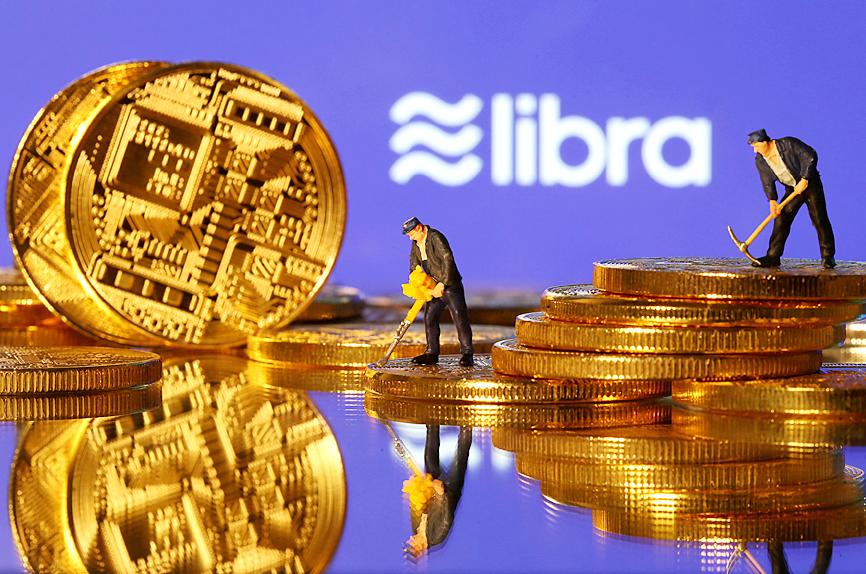Finance ministers and central bankers from G7 economies strongly support the need to regulate digital currencies, the US Department of the Treasury said in a statement on Monday after a virtual meeting.
German Minister of Finance Olaf Scholz issued a sharply worded statement after the meeting, underscoring his concerns about authorizing the launch of Facebook’s Diem stablecoin cryptocurrency in Germany and the EU.
“A wolf in sheep’s clothing is still a wolf,” Scholz said. “It is clear to me that Germany and Europe cannot and will not accept its entry into the market while the regulatory risks are not adequately addressed. We must do everything possible to make sure the currency monopoly remains in the hands of states.”

Photo: Reuters
US Secretary of the Treasury Steven Mnuchin hosted this year’s 12th meeting of G7 finance officials as Washington prepares to hand over the presidency of the G7 to London next month.
The G7 finance officials discussed ongoing responses to “the evolving landscape of crypto assets and other digital assets, and national authorities’ work to prevent their use for malign purposes and illicit activities,” the department said. “There is strong support across the G7 on the need to regulate digital currencies.”
The officials reiterated their support for a G7 joint statement on digital payments in October, which said they could improve access to financial services, and cut inefficiencies and costs, but should be “appropriately supervised and regulated.”
A stablecoin is tied to a traditional currency or basket of assets, and can be used for payments or storing value.
Facebook in June announced plans to launch a digital currency, but regulators fear that it could destabilize the global financial system.

UNCERTAINTY: Innolux activated a stringent supply chain management mechanism, as it did during the COVID-19 pandemic, to ensure optimal inventory levels for customers Flat-panel display makers AUO Corp (友達) and Innolux Corp (群創) yesterday said that about 12 to 20 percent of their display business is at risk of potential US tariffs and that they would relocate production or shipment destinations to mitigate the levies’ effects. US tariffs would have a direct impact of US$200 million on AUO’s revenue, company chairman Paul Peng (彭雙浪) told reporters on the sidelines of the Touch Taiwan trade show in Taipei yesterday. That would make up about 12 percent of the company’s overall revenue. To cope with the tariff uncertainty, AUO plans to allocate its production to manufacturing facilities in

TAKING STOCK: A Taiwanese cookware firm in Vietnam urged customers to assess inventory or place orders early so shipments can reach the US while tariffs are paused Taiwanese businesses in Vietnam are exploring alternatives after the White House imposed a 46 percent import duty on Vietnamese goods, following US President Donald Trump’s announcement of “reciprocal” tariffs on the US’ trading partners. Lo Shih-liang (羅世良), chairman of Brico Industry Co (裕茂工業), a Taiwanese company that manufactures cast iron cookware and stove components in Vietnam, said that more than 40 percent of his business was tied to the US market, describing the constant US policy shifts as an emotional roller coaster. “I work during the day and stay up all night watching the news. I’ve been following US news until 3am

Taiwan will prioritize the development of silicon photonics by taking advantage of its strength in the semiconductor industry to build another shield to protect the local economy, National Development Council (NDC) Minister Paul Liu (劉鏡清) said yesterday. Speaking at a meeting of the legislature’s Economics Committee, Liu said Taiwan already has the artificial intelligence (AI) industry as a shield, after the semiconductor industry, to safeguard the country, and is looking at new unique fields to build more economic shields. While Taiwan will further strengthen its existing shields, over the longer term, the country is determined to focus on such potential segments as

COLLABORATION: Given Taiwan’s key position in global supply chains, the US firm is discussing strategies with local partners and clients to deal with global uncertainties Advanced Micro Devices Inc (AMD) yesterday said it is meeting with local ecosystem partners, including Taiwan Semiconductor Manufacturing Co (TSMC, 台積電), to discuss strategies, including long-term manufacturing, to navigate uncertainties such as US tariffs, as Taiwan occupies an important position in global supply chains. AMD chief executive officer Lisa Su (蘇姿丰) told reporters that Taiwan is an important part of the chip designer’s ecosystem and she is discussing with partners and customers in Taiwan to forge strong collaborations on different areas during this critical period. AMD has just become the first artificial-intelligence (AI) server chip customer of TSMC to utilize its advanced